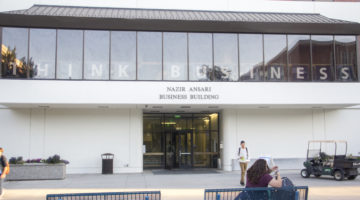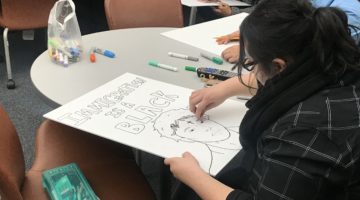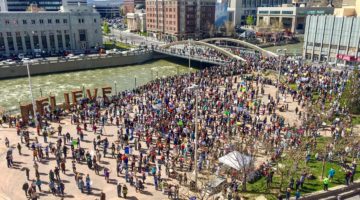Illustration by Leona Novio.
“Black lives matter.”
While the phrase seems simple, it has come to represent a rallying cry for the powerful movement that is spreading rapidly across America.
The movement began as a public response to police brutality that has been committed against minority citizens, with Michael Brown and Eric Garner being the two most notable examples. The two men from Ferguson, Missouri and Staten Island, New York respectively, were unarmed when killed by police officers, which has led many Americans to believe that these cases of excessive force was racially motivated.
Beyond proving the continued existence of racial inequality in America, the deaths demonstrated an equally discouraging revelation about institutionalized brutality in the American police system.
Neither officer was indicted for his actions, which enraged those who hoped that Brown, Garner and, symbolically, other minority people who suffered the same fate would receive justice.
The discrimination and brutality in the criminal justice system runs deep, but that does not make it permanent. Those of us who are witnessing the effects of brutality on a daily basis have both an opportunity and a responsibility to demand a justice system that is actually just.
It is easy to question if we can ever hope to challenge the nature of centuries-old systems and undo a legacy of oppression. Though we are only students, we can be confident in our abilities. Making a lasting difference requires one essential tool, and each of us on this campus already has it at our disposal: education.
As the future educated population of America, we have an opportunity to pursue careers that place us in the very institutions we seek to change; we are the lawyers who defend the powerless, the judges who enact true justice and the cops who recognize that wearing a badge does not make one above the law.
Yet we do not have to wait until we become professionals to do something meaningful with our education. Injustice can be combated right here in our city before we finish earning our diplomas.
The American political and legal systems are theoretically structured to promote the voices and influence of citizens, but our voices will not be heard unless we make them heard. Organized protest is an important way to advocate for change, and it can be a first step in initiating a larger social movement.
A memorial for Brown and Garner, as well as a protest against police brutality were held in Reno last Friday on 9th Street. Another protest is scheduled on Tuesday, Dec. 9 at 1 p.m. in the Mathewson IGT-Knowledge Center.
But what happens when the protest ends and we all go home? The problem doesn’t go away once people have put down their picket signs.
Rather than focusing our attention on short-lived events, we must work toward enacting institutional changes. For example, earlier this year the U.S. Department of Justice placed officers in the Newark Police Department as federal watchdogs in hopes of curbing police misconduct. This should be demanded nationally as a potential solution for police agencies.
These are the solutions that we must not only demand, but work toward ourselves. No one is going to do this work for us; together we must shoulder the burden of improving society and carry it with us until we can look at the fruits of our labor and say with certainty:
Black lives matter. Brown lives matter. Impoverished lives matter. Human lives matter.
The Nevada Sagebrush editorial staff can be contacted at cboline@sagebrush.unr.edu and on Twitter @TheSagebrush.













